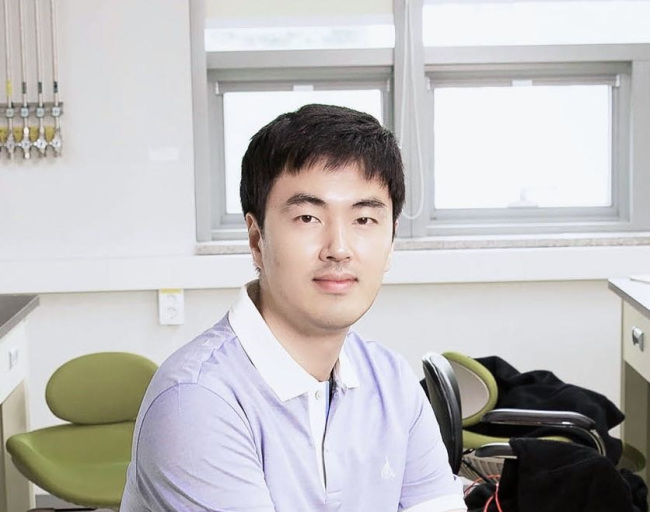The Korea Herald is publishing a series of articles highlighting South Korea’s promising startups in the emerging sectors of digital health care and next-generation medical devices. This is the 15th installment. - Ed.
ULSAN — Putting a needle through any part of the body is an unwelcoming experience. And the thought alone of injecting a sharp needle into an eyeball would make most people squirm.
However, this is how doctors typically deliver anesthetic medicine into the eye before an intravitreal injection — IVT, or a shot of medicine injected directly into the eye. Though eyedrop or gel-type anesthetics are also available, their effects are often insufficient, rendering the need for an additional anesthetic shot.
On top of the anxiety and pain associated with a needle in the eye, the anesthesia process — which includes delivering the anesthetics and waiting for it to take effect — is lengthy, costing more time than the operation itself.
Seeking potential in a technology that can replace current techniques, a South Korean thermal engineering specialist has set out to commercialize a new mode of retinal anesthesia based on rapid precision tissue cooling technology.
Meet Recens Medical — an Ulsan-based medical technology startup founded and led by Kim Gun-ho, an assistant professor of mechanical engineering at the Ulsan National Institute of Science and Technology.
Kim’s doctorate research at the University of Michigan was focused on studying how human cells react to heat, including sensing how quickly they lose heat as well as observing how their states change according to temperature.
Leveraging such characteristics, Kim developed a highly precise rapid cooling system that instantaneously freezes cells in the retina, keeping them anesthetized for a short timeframe. The CEO believes this instant freezing technique can replace chemical anesthetics and save costs.
“Right now, anesthesia procedures take up more than 50 percent of the time it takes for eye doctors to carry out the actual IVT,” said Kim in a recent interview with The Korea Herald in Ulsan.
“Our rapid precision cooling system is expected to greatly cut down the time currently required of IVT operations, enabling doctors to treat more patients, saving costs and time,” he said.
 |
Kim Gun-ho, founder and CEO of Recens Medical (Courtesy of Recens Medical) |
Recens Medical believes its technology will help meet growing demand for drugs that fight macular degeneration — a condition in which the macular, the small central area of the eye’s retina that controls visual acuity, deteriorates. It is the leading cause of vision loss among older adults.
Current US FDA-approved drugs to treat macular degeneration — Lucentis, Avastin and Eyelea — are all administered into the eye via an IVT, prior to which anesthesia procedures are needed.
The startup has built a handheld device with a battery-powered “cooling tip” that immediately brings down a nerve cell’s temperature to just slightly above 15 degrees Celsius — the temperature at which they are unable to function.
“The essence of our rapid cooling module is precisely dropping the nerve cells’ temperature down to around 15 degrees in one queue, without killing them,” Kim noted. “It’s like getting a car to drive at full power, and then getting to suddenly halt at the finishing line without the slightest error.”
Once the tip is removed from the eye, it takes around 30 seconds for the cells to return to their normal temperature. It is during this timeframe that doctors can perform an IVT, quickly and painlessly.
“Patients who have experienced our rapid cooling anesthesia system say they like the cooling feel. The absence of side effects associated chemical anesthetics such as prolonged dryness and discomfort, is another cited benefit,” Kim said.
According to the startup, there are currently no cooling-type anesthesia devices approved by the US Food and Drug Administration. Until now, development in this field has been limited, despite the benefits, due to the difficulties in engineering and precision design, Kim said.
Given this, Recens Medical is hoping to become the first company to get its rapid cooling anesthetic device approved by the US FDA. It is foremost planning to bring its device to the US, and then branch out to other markets elsewhere.
The startup is currently in the process of raising additional funds to conduct clinical trials for its device in the US. It plans to initiate the US trials next year via multiple contract research organizations.
In the long run, the firm wants to create an all-in-one version of the device with a tip that delivers not only the rapid-cooling anesthesia technique but also the main drug injection. It would allow doctors to anesthetize and then immediately perform the IVT, saving time and reducing infection risks, Kim noted.
Meanwhile, Recens Medical has another non-contact rapid-cooling anesthesia device in its development pipeline, designed for use on large patches of the human skin.
The device can shoot very tiny ice particles at select temperatures, delivering anesthetic effects. Kim believes this technology can potentially replace anesthetic creams which dermatologists now use to numb the skin's surface before performing a laser operation.
Recens Medical is currently backed by Korea’s Tech Incubator Program for Startup, a government-funded research and development program for promising Korean tech startups. It was also included in Bayer’s Grants4Apps Korea startup acceleration program this year.
By Sohn Ji-young (
jys@heraldcorp.com)





![[Exclusive] Hyundai Mobis eyes closer ties with BYD](http://res.heraldm.com/phpwas/restmb_idxmake.php?idx=644&simg=/content/image/2024/11/25/20241125050044_0.jpg)
![[Herald Review] 'Gangnam B-Side' combines social realism with masterful suspense, performance](http://res.heraldm.com/phpwas/restmb_idxmake.php?idx=644&simg=/content/image/2024/11/25/20241125050072_0.jpg)

